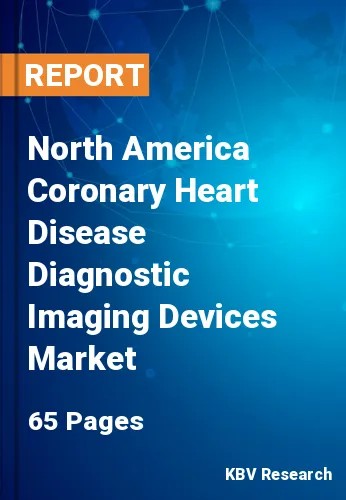The North America Coronary Heart Disease Diagnostic Imaging Devices Market would witness market growth of 6.2% CAGR during the forecast period (2022-2028).
Tobacco cessation, salt reduction in the diet, increased fruit and vegetable consumption, regular physical activity, and avoidance of problematic alcohol use can significantly lower the risk of cardiovascular disease. However, due to the hectic and unhealthy lifestyle of people all over the region, these requirements are not being fulfilled. These factors are leading to the rapid emergence of coronary heart disease among people. The coronary heart disease diagnostic imaging device can streamline the early detection of this disease in people, due to which, and it is widely being employed in several hospitals and healthcare facilities. Therefore, the demand for this device is surging.
High blood cholesterol levels can raise the risk of plaque development and atherosclerosis. A high level of low-density lipoprotein cholesterol, also known as bad cholesterol, can induce high cholesterol. A low level of HDL cholesterol, generally known as good cholesterol, can play a role in the development of atherosclerosis. Risk factors frequently occur in pairs, and one may set off another.
The occurrence of cardiovascular disorders is significantly higher in this region. In the United States, heart disease is the top cause of mortality for men, women, as well as people of most races and ethnicities. In addition, according to the Centers for Disease Control and Prevention, in the United States, one person dies from cardiovascular disease every 36 seconds. Heart disease kills over 659,000 people across this region each year, accounting for one out of every four deaths. Between 2016 and 2017, the United States spent $363 billion on heart disease. It covers the costs of healthcare services, medications, and lost productivity as a result of mortality. The most frequent type of heart disease is coronary heart disease, which killed 360,900 people in 2019. CAD affects 18.2 million people aged 20 and above. Adults under the age of 65 account for about 2 out of every 10 CAD deaths. Every 40 seconds, someone in the United States has a heart attack. Around 805,000 people in this region experience a heart attack each year. 605,000 of these are first-time heart attacks. People who have already experienced a heart attack account for 200,000 of the cases. About one in every five heart attacks is silent, meaning the harm has already been done but the victim is unaware of it.
The US market dominated the North America Coronary Heart Disease Diagnostic Imaging Devices Market by Country in 2021, and would continue to be a dominant market till 2028; thereby, achieving a market value of $581 Million by 2028. The Canada market is anticipated to grow at a CAGR of 8.6% during (2022 - 2028). Additionally, The Mexico market would showcase a CAGR of 7.7% during (2022 - 2028).
Based on Modality, the market is segmented into Nuclear Medicine, Computed Tomography, Ultrasound, X rays, and Magnetic Resonance Imaging. Based on countries, the market is segmented into U.S., Mexico, Canada, and Rest of North America.
Free Valuable Insights: The Global Coronary Heart Disease Diagnostic Imaging Devices Market is Estimated to reach $2.1 Billion by 2028, at a CAGR of 6.6%
The market research report covers the analysis of key stake holders of the market. Key companies profiled in the report include General Electric (GE) Co. (GE Healthcare), Koninklijke Philips N.V., Siemens Healthineers AG, Fujifilm Holdings Corporation, Canon, Inc. (Canon Medical Systems Corporation), Mindray Medical International Limited, Chison Medical Technologies Co., Ltd., and Analogic Corporation (Altaris Capital Partners).
By Country
Our team of dedicated experts can provide you with attractive expansion opportunities for your business.

